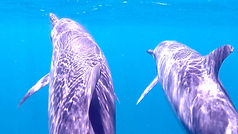

A Dolphins Plea for Help
Plastic Crisis in Our Oceans
“The plastic issue is a sustainability issue,” said Holmes Rolston III, a philosopher at Colorado State University and a leading expert in environmental ethics. “We cannot sustain the dumping of trillions of bits of plastic into the ocean. It is more of a moral issue now, more than it ever was, which makes it a lot like global warming."


“People can argue about climate change and say it is part of a natural cycle,” said oceanographer Nikolai Maximenko of the University of Hawaii, who has studied how debris interacts with currents and marine life. “But no one can deny plastic is a change we produced."
Exactly how much lies in our oceans is unknown. Available data suggest that about 300 million tons have entered the water since plastic went into mass production in the late 1940s, Maximenko said. (That’s comparable to more than 2 million blue whales, the largest animal ever known to have lived.) Every year, the worldwide total increases by about 8 to 10 million tons, with as much as 250,000 tons being microplastics that are smaller than a quarter-inch — the width of a pencil eraser.


“There is very little doubt these particles are in our food and water supply at this point,” said Phoebe Stapleton, an assistant professor of pharmacology and toxicology at Rutgers University who studies their still-unknown effects on human physiology.
A study led by the Scripps Institution of Oceanography at the University of California at San Diego found that plastic is part of our fossil record, deposited in ocean floor sediment for the past 70 years. Nanoplastics, the smallest plastic particles, can be conveyed in water vapor and have been found in Antarctic ice as well as in rain high atop the Andes. They also have been found in seafood we eat, our beer and drinking water — even in our feces. Microscopic bits of plastic are indeed inside of us. Living in an age of plastic, we have become plastic.